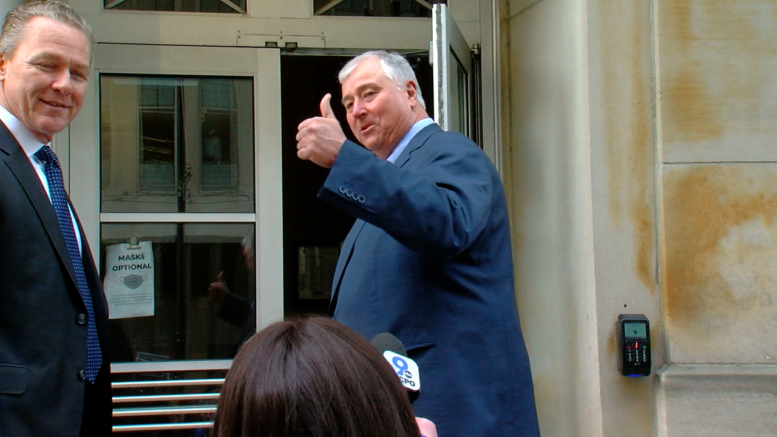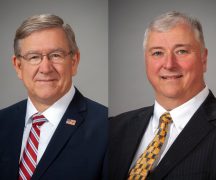CINCINNATI — If jurors rely on their common sense they’ll know that Akron-based FirstEnergy gave former Ohio House Speaker Larry Householder $60 million for one reason: to pass a billion-dollar bailout for the company, federal prosecutors asserted Tuesday.
But one of Householder’s attorneys accused the feds of bias in selecting their so-called mountain of evidence, taking only that which suited their narrative.
“It’s government lying,” attorney Steven Bradley told jurors.
After six weeks of testimony, the attorneys are making closing arguments in the racketeering case against Householder and Matt Borges, a former Ohio Republican Party Chairman who was working as a lobbyist at the time the energy bailout was passed and when it faced an attempted repeal. When the men were arrested in July 2020, then-U.S. Attorney David DeVillers said it was likely the biggest bribery and money laundering scandal in Ohio history.
Through Tuesday morning and into the afternoon, Assistant U.S. Attorney Matthew Singer argued to jurors why they should convict the defendants.
Then lawyers for the defendants made their arguments. Because the burden is on the prosecution to prove the case, it will have a chance at rebuttal on Wednesday morning.
Singer walked jurors through the elements the government has to prove to show that Householder and Borges are guilty. Among them, prosecutors must show that each man engaged in at least two acts of racketeering.
“There are dozens of racketeering acts in this case,” Singer said.

He pointed to 59 transfers of $10,000 or more in money from FirstEnergy and its subsidiary, FirstEnergy Services, through a 501(c)(4) dark money group controlled by Householder and into a separate account.
Prosecutors allege that Householder used tens of millions originating with the two companies beginning in 2018 to recruit and support House candidates who in January 2019 voted to make him speaker. From that perch, Householder pushed through House Bill 6, the $1.3 billion bailout, almost all of which benefited FirstEnergy.
As he did so, he and his allies used dark money that originated with FirstEnergy to run commercials providing “cover” for lawmakers to vote for the unpopular bailout, prosecutors said. Then, when a group started gathering signatures to put a repeal measure on the ballot, Householder demanded to oversee a $36 million onslaught. It financed ads that falsely portrayed the repeal effort as a Chinese attempt to take over Ohio’s power grid and it paid people to harass and assault petition circulators, prosecutors and witnesses said.
Importantly, prosecutors produced witnesses and written messages indicating that Householder was pushing legislation to declare that HB 6 was a tax in the event the repeal succeeded. Under Ohio law, laws creating or raising taxes can’t be repealed through citizen-initiated legislation, so declaring HB 6 a tax would render the repeal effort moot.
“He is running millions of dollars through his (dark money) organization and proposing legislation,” Singer said. “This is bribery under the court’s instructions.”
To convict Householder, prosecutors have to show that Householder came to an understanding with FirstEnergy in exchange for an official act, such as passing legislation.
They called as witnesses co-defendants Juan Cespedes, a lobbyist, and Householder fixer Jeffrey Longsthreth — both of whom pleaded guilty in exchange for sentencing recommendations. Both testified that it was clear to them that Householder’s support of HB 6 was in exchange for all that FirstEnergy money. Singer cited Householder’s bill to retroactively call the bailout a tax as yet another official act in exchange for that money.
Prosecutors also had to show attempts to conceal their actions in order to convict Householder and Borges.
“Facts are not concealed for no reason,” Singer said.
He and his colleagues produced records and witnesses showing that subordinates were told to erase emails and text messages and to keep certain conversations to themselves. But more fundamental was the ubiquitous dark money that funded the effort behind HB 6.
As a 501(c)(4), the dark money group Householder controlled — Generation Now — didn’t have to disclose its donors. Tens of millions in FirstEnergy money passed through it and into groups such as Hardworking Ohioans, which financed ads attacking candidates who were not on “Team Householder” and lawmakers who didn’t support House Bill 6.
The objects of those ads and the public in general had no way of knowing that FirstEnergy, the beneficiary of the bailout, was paying for them.
To underscore his point, Singer played a secret recording of Neil Clark — a lobbyist who was a co-defendant until he died by suicide in 2020.
“If you have a C4, you can receive as much money as you want and nobody’s ever going to know,” Clark said.
Defense arguments

During his presentation, Householder attorney Bradley focused on inconsistencies in the testimony of some of the prosecution’s witnesses.
For example, Cespedes testified that in an Oct. 10, 2018 meeting at Householder’s offices, lobbyist Robert Klaffky slid a $400,000 check from FirstEnergy Services across a conference table and under Householder’s hand. But Klaffky and Householder testified that the meeting took place in a lobby where there was no conference table and that FirstEnergy Services Vice President Dave Griffing gave Householder the check — not Klaffly.
Klaffky “described it completely differently,” Bradley said.
But Klaffky and Cespedes agreed on two fairly salient details: that Householder accepted a $400,000 check from FirstEnergy Services three months before he launched an all-out push to pass a billion-dollar bailout for company. And that the check was made out to Generation Now, even though Householder claimed not to control the group or to know very much about dark money.
Bradley also sought to undermine the prosecution’s account of Householder’s attendance at Donald Trump’s inauguration from Jan. 18-20, 2017. Householder flew there on a FirstEnergy jet and he stayed in a hotel room paid for by a Cleveland businessman whom Singer said was acting as a FirstEnergy lobbyist.
Longstreth described dinners he attended with Householder and FirstEnergy executives Chuck Jones and Michael Dowling. Back in Ohio a few weeks later, Longstreth registered Generation Now, the main dark-money vehicle to pass and protect HB 6.
In prosecutors’ telling, Bradley said, the trip to the inaugural was supposed to be the origin of the supposed HB 6 conspiracy. But, he argued, those dinners couldn’t have happened.
Bradley displayed a FirstEnergy itinerary indicating that Jones was in Naples, Fla., until the morning of Jan. 19, 2017. And when he was on the stand, Householder said he never attended the dinners Longstreth described.
For their part, prosecutors cited Householder’s own testimony that he had attended events with his son throughout Jan. 19, 2017. Then they showed a photo of Householder’s son — and what they said was a part of Householder’s trousers — in a limo that evening. The metadata accompanying the photo indicated that they were just outside the steakhouse where the second dinner described by Longstreth took place.
The $500,000
Also important to the case against Householder is the more than $500,000 in personal benefits he received that originated with Generation Now. On his behalf, Longstreth settled a lawsuit, paid off $20,000 in credit card bills and handled repairs to a Naples home that Householder owned.
“It’s a loan that eventually became a business agreement,” Bradley said, again refuting that his client had been bribed.
He cited legal documents that were drawn up to memorialize the agreement.
“This is all a loan that they documented,” Bradley said. “I don’t understand what we’re talking about here. This is a nothingburger.”
But when he testified, Longstreth said he was the one who pushed for the documents, and he was never able to get Householder to sign them.
Borges

In the case of Borges, prosecutors portrayed him as having a much smaller role in the conspiracy. On Tuesday, Borges’ attorney, Karl Schneider tried to slim that down in the eyes of the jury to no role at all.
“Mr. Borges wasn’t involved in a racketeering conspiracy,” he said, explaining that his client was nowhere near the steakhouse meetings during the Trump inaugural or the Oct. 10, 2018 meeting where Householder got a FirstEnergy Services check for $400,000.
“The most you see in the evidence that Matt had to do with House Bill 6 was that he may have done a whip count one time,” Schneider said.
However, evidence from the trial showed that Borges was involved in several aspects of the battle to frustrate the repeal of HB 6. Cespedes said Borges contacted Attorney General Dave Yost in an attempt to delay signature-gathering efforts or to keep the matter off the ballot altogether.
The FBI also recorded conversations between Borges and Tyler Fehrman, who was helping manage the effort to gather signatures to put a repeal on the ballot.
Borges pressed Fehrman for inside information about the effort. Borges claimed it was unrelated to the information, but he also paid Fehrman $15,000, Fehrman testified.
In his presentation, Assistant U.S. Attorney Singer cited a few statements by Borges to Fehrman that he said show Borges knew he had something to hide about their interactions.
“It would be bad for both of us if a story came out, but it would be worse for you,” Borges said at one point.
At another, he said, “If I get a call from (former Columbus Dispatch reporter) Randy Ludlow, I’m going to blow up your house.”
The prosecution’s rebuttal of the defense attorneys is expected to last about an hour Wednesday. The jury will then start deliberating.
Also from Ohio Capital Journal:




